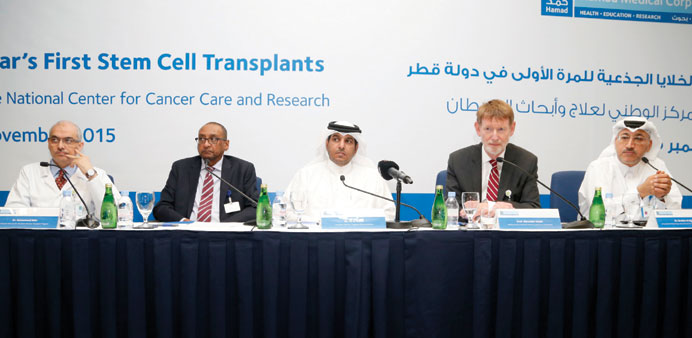Prof Alexander Knuth and other NCCCR officials at the press conference yesterday.
By Joey Aguilar/Staff Reporter
The National Centre for Cancer Care and Research (NCCCR) will focus on establishing a donor registry in Qatar amid plans to perform another type of stem cell procedure called allogeneic transplant in the middle of next year.
NCCCR medical director Prof. Alexander Knuth told Gulf Times that residents can donate stem cells without any health risks to them.
“We have a healthy donor registry being built and anyone can donate,” Prof Knuth stressed. “No risk, we produce stem cells everyday by the billions.”
He was speaking at a press conference yesterday announcing Hamad Medical Corporation’s significant development for Qatar in treating blood cancers. He was joined by NCCCR’s bone marrow transplant programme director Dr Mohamed Bakr, corporate communications executive director Ali al-Khater, and Haematology acting head Dr Ibrahim al-Hijji.
HMC has achieved yet another milestone with the successful completion of the first stem cell transplants in Qatar recently, benefiting two expatriates who had an aggressive form of blood cancer called ‘myeloma.’
Prof Knuth noted that allogeneic is more efficient but expensive and also a little bit more complicated than autologous transplant, now being performed by NCCCR.
He said accumulated expenses calculated from the patient’s daily treatment for autologous transplant abroad is between $20,000 and $80,000.
Cost for the other procedure maybe thrice more expensive due to some involvements such as the donor, donor registry, and the treatment after the transplant.
“It also depends how expensive your service is when you calculate the amount to pay for this,” he explained.
Allogeneic has two capabilities: first, it repopulates the patient’s bone marrow – a process similar to autologous. However, a special medication is applied to prevent stem cells (of the donor) from being rejected which “basically the added complication to it.”
“Second component is that they also have immune control function against any residual cells in the marrow or wherever. They recognise these cells as foreign and something to be destroyed.”
He pointed out that identical twins or close relatives would be ideal donors since they are more likely to have the same genes.
For the autologous procedure, healthy stem cells are collected from the patients’ blood using a special mobilisation process and equipment. This process is done at NCCCR and considered as the most convenient and safe method for the patient.
Two expatriates had benefited from Qatar’s first stem cell programme performed by a highly-trained team at NCCCR. They are now fully reconstituted but it will take about three months before everything comes back to normal.
The patients were given a moderate dose therapy to stimulate the stem cell production. Then stem cells were collected, purify and freeze them (stored).
At the hospital, they get a high dose therapy and one day after when the effect of the chemotherapy fades away and cannot damage the cells anymore, they get the cells back (their own frozen cells) and transplanted back into their system to enable healthy, disease-free bone marrow to grow.
“We know from other trials that if we give high dose chemotherapy with autologous stem cells support, the chance of long term survival is better and the chance of non recurrence of the disease is better,” Prof Knuth added.

